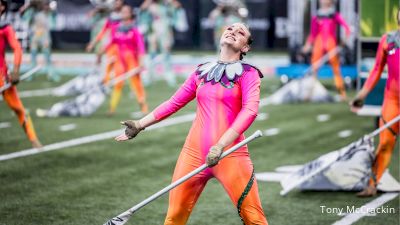DCI's Tour Reopening Task Force Talks Getting Back On The Field In 2021
DCI's Tour Reopening Task Force Talks Getting Back On The Field In 2021
David Glasgow breaks down the purpose of the Tour Reopening Task Force and its relationship with DCI and the corps to make a safe 2021 season possible.

Throughout the COVID-19 pandemic, Drum Corps International and its member corps have been working behind the scenes to make a 2021 season possible, especially after the complete cancellation of the 2020 season.
The Tour Reopening Task Force is leading the charge on gathering information and resources for the corps to use in their planning for the 2021 season.
At the head of that task force is David Glasgow, former Executive Director and CEO of the Bluecoats for 15 years.
How was the Tour Reopening Task Force formed?
Glasgow: It's been ever-evolving since March. When things started to crystallize a little bit, Dan Acheson reached out to me. The idea came out of DCI's marching arts health & wellness group, to Dan, and then to me. He said, "we really need to start working on a set of protocols, guidelines, and resources for the corps to help manage through whatever we decide to do."
He came to me because I'm not currently a director but I am on the DCI board. I have 15 years of experience with Bluecoats—I've got experience running a corps so I think he thought I could be someone to see the process through.
What was the goal from the outset for the Tour Reopening Task Force?
Glasgow: The goal was really to put together a set of guidelines and resources that the corps could use to safely operate in a pandemic—addressing all of the major key areas of corps operations and putting together recommendations for how to do that as safely as possible.
We did this not only through people that have corps operation experience, but drum corps is very fortunate to have quite a few people that are true experts in the medical field—and also tie in experts from the public health field as well as risk management experts and experts in law. It was a nice balance between people that had experience in corps operations and experts in the field.
Who makes up the team of experts advising the Task Force?
Glasgow: In a nutshell: it's several corps directors, a couple of people with experience working on DCI staffs, other people with experience purely with tour operations, two or three doctors, a couple of athletic trainers, a public health expert, a nutritional expert, a few lawyers and a risk management expert.
With how unpredictable this pandemic has been, I'm sure some of your advice has changed over time. What have been some of the landmarks along the way that have changed the way the Task Force has approached giving guidance to the corps?
Glasgow: The first thing we did was try to identify all of the areas of corps operation that we would need to address in order to come up with protocols to keep everybody safe. We very heavily leaned on the Center for Disease Control's (CDC) guidelines. Where things have changed is where definitions in the CDC's guidelines have changed. That is something that will continue to change, which we will continue to monitor.
We've also put together some metrics that we need to be looking at in terms of positivity rate, and things like that, to help us determine if it will be safe to operate. As of today, obviously, things are not good. But, what we're going to do is look at trends, closely monitor those, and use those to make decisions moving forward. Those aren't necessarily the decision of the Tour Reopening Task Force, but our mandate is to provide objective information to help guide the decisions of DCI's voting membership.
What exactly is the relationship between the Task Force and the corps?
Glasgow: That's going to evolve over time, probably. But going into it, our goal was to provide a series of recommendations, guidelines, and resources for them to then use as they see fit. They may choose to turn certain things into policy, they may choose to make certain things absolute requirements. Right now, we just wanted to make sure we provided as much information as we could—to give them the best information that we can.
What have been the biggest points of concern that the Task Force has been looking at minimizing during the 2021 season?
Glasgow: They're the same things that everybody would consider in everyday life. Looking at in-person contact, not only within the group but with people out of the group. How to manage what happens if somebody does get sick—this is something we've been spending a lot of time really working on, especially our medical experts. They've done a good job of putting together a very thorough set of protocols for what happens if somebody were to get sick. Testing is also an important part of this project that we've addressed. PPE, signage, and information and equipment that will be needed.
Those are the main buckets: personal contact, testing, resources and PPE. There are more, but the guidelines address every major element of corps operations. Every corps is a little bit different in how they operate so every corps is going to have to take a look at it and say 'okay, how does this apply to me? What can we do to plan to make sure that we apply these guidelines in a way that makes sense for our organization?'"
How has the recent news of vaccines affected your work so far?
Glasgow: We tried to set up these guidelines not necessarily reliant upon a vaccine. At this point, at this stage, we're unsure exactly of how that rollout is going to go. We're trying to plan for all contingencies. Anything related to the CDC guidelines as far as quarantine lengths, we're absolutely paying attention to all of those things. We're making changes to our guidelines where necessary, based on the recommendations by the CDC—and we'll continue to do that so if things change dramatically between now and May, June, July, August, etc.
What changes do you foresee the members will have to endure to stay safe in the 2021 season?
Glasgow: Well, I think a lot of the things that everyone has had to do and pay attention to in life I think will also apply to drum corps. Wearing masks, being careful about in-person interactions, making sure you're quarantining when it's necessary to do so. It's going to require discipline, it's definitely going to be a tighter scenario compared to what many members in the past are used to. But, they're not new concepts. Life has changed for everyone in pretty much every way as it relates to what we can do and what keeps us safe—I think that's going to be consistent with the drum corps experience when we're able to start back up again.
"This group is really taking this seriously. The corps are really taking this seriously. Everybody is doing the absolute best they can."
Related Content
 2024 Bluecoats Opening Night Community Celebration Debuts on Flo, June 29
2024 Bluecoats Opening Night Community Celebration Debuts on Flo, June 29Mar 11, 2024
 How to Watch: 2024 Bluecoats Opening Night Community Celebration
How to Watch: 2024 Bluecoats Opening Night Community CelebrationMar 11, 2024
 How to Watch: 2024 DCI World Championship
How to Watch: 2024 DCI World ChampionshipMar 4, 2024
 How to Watch: 2024 DCI Rochester
How to Watch: 2024 DCI RochesterMar 4, 2024
 How to Watch: 2024 DCI Eastern Classic
How to Watch: 2024 DCI Eastern ClassicMar 4, 2024
 DCI 2024 Streaming Schedule: What Will Be LIVE On FloMarching This Summer
DCI 2024 Streaming Schedule: What Will Be LIVE On FloMarching This SummerMar 4, 2024
 How to Watch: 2024 Music on the March
How to Watch: 2024 Music on the MarchMar 4, 2024
 How to Watch: 2024 CrownBEAT
How to Watch: 2024 CrownBEATMar 4, 2024
 How to Watch: 2024 Midwest Premiere
How to Watch: 2024 Midwest PremiereMar 4, 2024